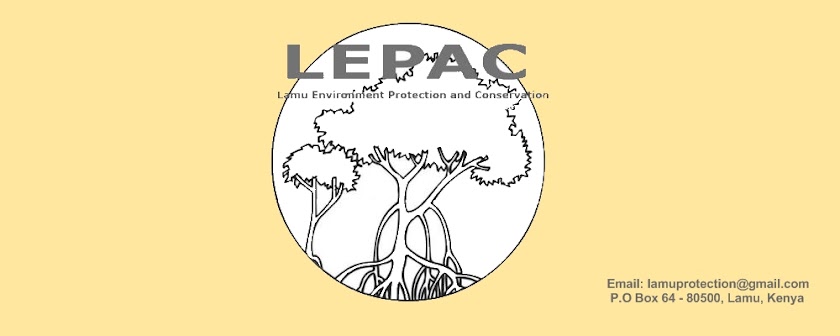Follow the link below to hear more about the proposed port project and the views of the community.
http://www.diplomateastafrica.com/index.php?option=com_content&view=article&id=405:infrastructure-lamu-port-the-dilemma-of-heritage&catid=46:economy&Itemid=81
Tuesday, December 28, 2010
Monday, December 27, 2010
Save the Lamu Archipelago
Dear Friends of Lamu:
Most of us are watching uneasily as the plans for the proposed port are made in Nairobi
LEPAC (Lamu Environment Protection and Conservation group), is a community-based organization in Lamu that began in 2009. The groups’ objective is to create awareness on the importance of conserving and protecting Lamu’s marine and land ecosystem from environmental degradation and unsustainable development. Currently, LEPAC’s attention is focused on the proposed Lamu port.
LEPAC believes that the government needs to
- seek dialogue with the community to hear its concerns about the construction of the port and to take these into consideration in its planning
- make public an Environmental and Cultural Impact Assessment Report
- ensure that the environmental impact of the port is minimal
- ensure that the local community benefits from opportunities from the development of the port
- provide land reforms (as pertains to the new constitution) to be implemented before port plans are inaugurated
To realize these goals, LEPAC is working with a legal team from Natural Justice, an international NGO based in South Africa and The Centre for Minority Rights, based in Nairobi. Other institutional affiliations are: INUKA, an NGO started by John Githongo in Nairobi and Development Policy Management Forum (DPMF), a think-tank examining land and resources in Coast Province, as well as local community-based organisations including Sauti ya Wanawake, LAMCOT, Kenya Marine Forum, Wanaharakati Okoa Lamu, Imams, Baraza la Wazee, Shungwaya Welfare Association, Lamu Beach Management Unit, Muhuri, HURINET, Lamu Preservation Network, Chonjo Community Action Group and representatives from the Boni, Orma, Sanye, Swahili and Bajuni communities.
With the assistance of the affiliated institutions, LEPAC has begun to sensitize local communities about the port project and it has begun to collect information about the community’s concerns if the port is built. This information forms a core for preparing a Bio-Cultural Community Protocol (BCP).
What is a bio-cultural community protocol? 1. Bio-cultural community protocols are instruments that facilitate culturally rooted, participatory decision-making processes within communities with the aim of asserting rights over their communally managed lands and traditional knowledge. 2. Community protocols are based on communities’ customary norms, values, and laws and set out clear terms and conditions to governments and the private, research, and non-profit sectors for engaging with communities and accessing their local resources. 3. Community protocols facilitate conservation and sustainable use of biodiversity by ensuring that decisions regarding communally managed resources rest firmly with the communities who have served as stewards of these resources over many generations. |
Community protocols are locally developed legal instruments that seek to address the lack of community involvement in the development and implementation of laws and policies that affect their communally managed lands, resources, and ways of life.
Collecting information to create a BCP is labour intensive. It means traveling to various villages in the area and islands in the archipelago, meeting with different indigenous communities, sensitizing them about the port project and gathering information as to how it will affect them in terms of continuity of their cultural values and their access to traditional resources.
LEPAC has organized a coordinating committee for facilitating the BCP. This coordinating committee is made up of representatives from affiliated groups and members of the indigenous communities in Lamu District. There are a total of 23 representatives that make up the BCP working committee.
How you can help
We need assistance to transport a team to Lamu East and Lamu West Constituencies in order to sensitize the communities and collect information. Each constituency will involve a 3-day visit in order to economise transportation costs to the outlying villages on the mainland and on the islands.
Team of 8 BCP Representatives visiting 16 villages including Kiunga, Kiwayu, Dau, Kizingitini, Siyu, Shanga, Pate
Total Ksh 113,000 or US $ 1,500
To Lamu West (3-day trip)
Team of 8 BCP representatives visiting 10 villages including Mokowe, Bargoni, Mgini, Ndununui, Mkunumbi, Sanye areas x 2, Dide Warede, Pananguo and Witu
Total Ksh 82,000 or US $ 1,050
Budget Summary
Lamu East: 8 people on 3-day trip to 16 villages Ksh 113,000
Lamu West: 8 people on 3-day trip to 10 villages Ksh 82,000
Total Amount of Money Needed Ksh 195,000 or US $ 2,550
Please help us to Save the Lamu Archipelago by donating money for our team to reach the communities that will be effected by the port project and to collect information in order to create the bio-cultural community protocol, the legal tool we use to lpress the government to be transparent, to provide an environmental impact assessment report, to carry out land reforms and to make sure that the port benefits the local community.
Send your donations today to:
Hadija Ernst, treasurer of BCP coordinating committee
tel 0722-859594
email: lamuprotection@gmail.com
For Cheques, please make payable to:
Lamu Environment Protection and Conservation Group
For direct bank transfers:
Account name: Lamu Environment Protection and Conservation Group;
Account no. 1111279683
Bank: Kenya Commercial Bank, Lamu Branch
SWIFT CODE: KCBLKENX
Yours Sincerely,
Mohamed Ali Baddi
LEPAC Field Coordinator
LEPAC Members:
Famau Ahmed, Chair
Mohamed Ali Athman, Treasurer
Omar Twalib Mzee, Secretary
Mohamed Ali Baddi, Field Coordinator
Mohamed Awadh Guro
BCP Working Committee
Omar T. Mzee LEPAC
Mohamed Ali Baddi LEPAC
Abubakar Al-Moody Lamu Preservation
Noor Salim Sauti ya Wanawake
Raya Famau Sauti ya Wanawake
Mushsin Said Ali Riyadha Mosque
Idarus Alwy Swafaa Mosque
Ali Gabo Boni Community
Ali Godana Orma Community
Hussein Soud Baraza la Wazee
Abubakar Khatib Wanaharakati Okoa Lamu
Walid Ahmed Lamu Youth Alliance
Zainab Golo Orma Community
Mohamed Mbwana Shungwaya
Atwaa Salim LAMCOT
Prof Ali Shekue Beach Management Unit
Hussein Miji Lamu Youth Alliance
Omar Barisa Luma Sanye Community
Female Rep HURINET
Female Rep Siyu Community
Hadija Ernst Chonjo Community Action Group
Mohamed Athman Kenya
Umu Kheir MUHURI
Subscribe to:
Posts (Atom)
